A follow up on my previous article Artificial Intelligence & Unemployment (Part One)
Disproving the Prevalent Theory that Technology and AI are Permanent Job Destroyers
Plenty of articles have been written on the potential dangers technology can have on the labor market. But plenty have also been written by economists and technologists to disprove that sentiment. I personally agree with the disproval side and stand for technology rather than against it, but I do not believe I can add further value as there are many high-quality resources currently available on this side of the fence.
Here are some links to free articles and videos that I have found convincing (in addition to my small contributions from Part One of this article). If you are still unsure on where to stand on this issue, you are welcome to check some of them out:
1. Why AI Will Save The World - Marc Andreessen Substack
2. Will the Job Market Collapse Due to Artificial Intelligence? - YouTube
3. The big debate about the future of work, explained - YouTube
4. AI will take some jobs, but mass unemployment isn’t inevitable | Erin Ling | The Guardian
5. Why I'm not worried about AI causing mass unemployment (understandingai.org)
In addition to these resources, the October 2020 Future of Jobs Report published by the World Economic Forum provided some hard numbers on the case for new technologies contributing positively to the labor market:
“… we estimate that by 2025, 85 million jobs may be displaced by a shift in the division of labor between humans and machines, while 97 million new roles may emerge that are more adapted to the new division of labor between humans, machines and algorithms.”
World Economic Forum - The Future of Jobs Report October 2020
To hopefully hit the final nail on this coffin, I would suggest skimming through the very latest Future of Jobs Report published by the World Economic Forum in May 2023:
Here are some quotes from that report:
“The impact of most technologies on jobs is expected to be a net positive over the next five years.”
“All but two technologies are expected to be net job creators in the next five years: humanoid robots and non-humanoid robots.”
World Economic Forum - The Future of Jobs Report May 2023
Below is a graph from the WEF May 2023 report depicting the expected net effects of certain technologies on employment in the next five years. All but two technologies are expected to create more jobs rather than destroy jobs. Please click on the Source link if you require a clearer picture.
Ok, so New Technologies are in fact Not Permanent Job Destroyers, What next?
Once we accept that new technologies will not lead to permanent job destruction but in fact create new ones, the next interesting question for me is as follows:
Given the proliferation of new technologies and its benefits, what will the nature of future labor look like when these technologies are taken to its limits?
Allow me to walk you through a thought experiment to illustrate the essence of my question: Let us take the cognitive labor of arithmetic calculation, introduce technologies into that labor, and see what happens to the nature of this labor at its technological limit.
I have separated cognitive labor into two categories:
- Conceptual knowledge (the ‘why’ part of knowledge, involved with a deeper understanding of a phenomenon)
- Procedural knowledge (the ‘how’ part of knowledge, i.e. technical skills, involved with the memorization and execution of rules and procedures)
The Thought Experiment
Some of us may be old enough to have experienced using pen and paper to perform a complex arithmetic calculation such as this one:
Required skills to perform this labor:
With the introduction of the calculator and other calculating technologies such as a spreadsheet (e.g., Microsoft Excel), the new labor of arithmetic calculation looks like this:
Required skills to perform this new labor:
Notice that with the introduction of new calculating technologies, almost all of the previous skills required is no longer relevant, and a new easier set of skill is created. The previous technical skills (procedural knowledge) of writing numbers, understanding the process of operations, and simple arithmetic are no longer needed (in fact, these skills will now decelerate the task).
The only previous skill that is required is the understanding of the concept of arithmetic itself (conceptual knowledge), and a new and easier procedural knowledge is created, which is operating a calculator or a spreadsheet.
With the introduction of speech recognition technology, the new labor of arithmetic calculation now looks like this:
Required skills to perform this new labor:
Just like what occurred in the previous case, all previous procedural knowledge is no longer required, and a new and even simpler procedural knowledge is created → operating a smart phone and speaking commands to it.
With the advent of Brain-Computer Interface technology currently endeavored by companies like Elon Musk’s Neuralink, hardware and software will eventually be able to ‘read your mind’ from the given electrical impulses generated by different areas of your brain. The new labor of arithmetic calculation now looks like this:
Required skills to perform this new labor:
As we can see, when we introduce the effects of technology to its limits, the only labor required for the performance of complex arithmetic will only consist of conceptual knowledge: an understanding of the concept of arithmetic itself (without any of the technical skills to back it up). All procedural knowledge has been outsourced to the prevailing technology.
Is it possible to take this thought experiment even one step further?
Why do we even need to understand the concept of arithmetic in the first place? Or calculus? Or biology for that matter? Is it possible that at the limits of technological proliferation, most of conceptual knowledge itself may be unnecessary?
It does not seem unconceivable that technology will eventually allow us to simply state whatever we wish without the slightest understanding of any conceptual knowledge required to produce the outcome.
Infact, many of us are already doing this on a regular basis, probably without realizing it. Every time we utilize Google Maps, we are entering our wishes as inputs (starting location and ending location) in order to receive informative outputs (directions, estimated arrival time, and modes of transportations available). It is likely that the majority of us do not have the slightest clue on the electrical engineering, calculus, physics and software engineering concepts required to perform this seemingly simple but incredibly complicated task. Most of the conceptual and certainly all of the procedural knowledge has been synthesized and algorithmized by the work of Google engineers and is executed almost instantaneously every time a user inputs his or her wishes to the software.
Granted, this thought experiment may seem a little extreme because we are extrapolating towards the imaginable limits of technology. We are thinking at the limit. Before we get there however, we are experiencing a more collaborative or symbiotic relationship between technology and human labor whereby human labor is still required to contribute conceptual and procedural knowledge, whilst the rest are outsourced to technology for the sake of greater efficiency and effectiveness.
In Bill Gates’ March 2023 blog post: “The Age of AI has begun”, he discusses the contributions that AI can make towards health and education. In the field of health, he mentions AI increasing workers’ efficiency in administrative tasks such as insurance claims filing, handling paperwork, and drafting doctor’s notes. In medical research, he discusses how AI would greatly contribute to the management and processing of extremely large amounts of complex data that is generated in that field. Medical breakthroughs will be accelerated by AI’s superior information processing capabilities. In the field of education, he continues that AI will be able to recognize students’ interest and understanding level and tailor their educational content accordingly. Other tasks in education that can be assisted by AI include grading and providing feedback on students’ writing assessments.
In all of the examples he provided, there seems to be an underlying assumption of symbiosis and collaboration between AI and human labor. AI is still seen as an assistant and augmenter of human labor, rather than a substitute for it.
This is very different from Elon Musks’ view stated at the 2019 World Artificial Intelligence Conference in Shanghai:
“AI will make jobs kind of pointless…”
“Probably the last job that will remain will be writing AI software, and then eventually the AI will just write its own software."
Today at least, there is still plenty of room for humans to contribute on both the conceptual and procedural arena of cognitive labor. We still require and prefer human financial advisors to be educated in the concepts of finance and be able to calculate and interpret financial data for clients in a meaningful way. We still require human civil engineers to be trained on the concepts of physics and material science and be able to perform the calculations required in those fields. We still want human painters who have good conceptual understanding of color combinations and have the technical skills to translate them onto the canvass. These are all reasonable expectations in today’s labor market.
However, I do not believe it is unconceivable to imagine a future whereby human labor will be stripped down to only its bare necessities of conceptual knowledge, whilst all technical knowledge and endeavors will be a thing of the past. It only seems like a matter of time.
AI Presence in the Creative Landscape
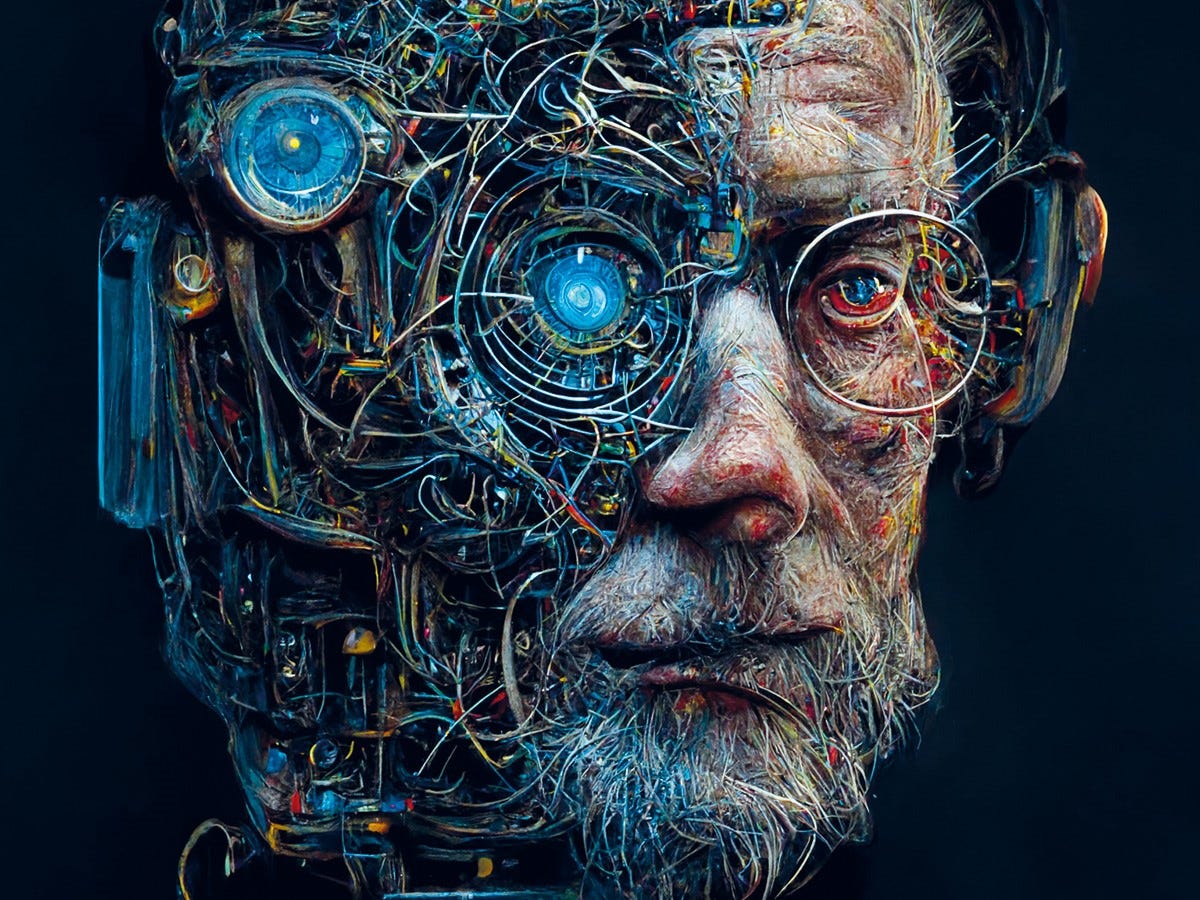
If you think physics and engineering are difficult subjects, try drawing or painting. Physics and engineering certainly fall within a set of definitive rules predetermined by the physical laws of nature. The domain of art however, is much more subjective. This so-called ‘soft skill’ and creative task is in itself a skill that may require years of practice for a human being to cultivate. It is a skill that is seemingly more difficult to algorithmically capture.
It turns out however that ‘soft skills’ involved in the art domain is also starting to be outsourced to AI technology. Today, one is no longer required to hone or possess any drawing abilities (whether conceptual or procedural) in order to produce good art. One simply has to input simple commands.
Below is an AI generated illustration based only on a few inputs of text:
“Woman reading book, under a night sky, dreamy atmosphere”.
If you look closely at the picture, you can see that the AI here is not yet perfect. The book is not really drawn properly (how many books is she reading?) and there seems to be something odd about the woman’s face, as if she’s wearing a mask. Nevertheless, we can be certain that improvements on this technology will come much sooner rather than later.
Other so called ‘soft skills’ such as writing songs and essays have already been performed quite frequently using AI. There is currently an issue in schools today whereby students are using ChatGPT to write their essay assignments for them, which isn’t all that surprising given the quality of work it is producing.
I suppose this brings to question the true ‘soft-ness’ of art. Is art really a soft skill only reserved to human beings if it can ultimately be reduced to an algorithm? Some have defined creativity as the ability to produce something original or novel that is of value. If that is the definition of creativity, then the AI generated pictures above are creative illustration, produced by a non-human entity which possesses zero sentient qualities.
Others will say that AI art is not creative as it simply collects large amounts of existing data, processes that data and regurgitate them in a novel manner (which is what ChatGPT does in text form). But isn’t that exactly what human brains fundamentally do? Is it not true that all human creativity and invention stems from the synthesis and new interpretation of the pantheon of currently existing knowledge? Original ideas seem to be unlikely unless there is an existing set of knowledge on which to stand on. This leads to a deeper philosophical question on creativity: Where do new ideas come from, if not from the derivation of currently existing ones? Do they randomly appear out of the abyss? I find that incomprehensible.
I am no computer scientist by any stretch of the imagination, but I struggle to distinguish any meaningful difference in the way an artificial intelligence operates compared to the way human intelligence operates. I am not stating this to degrade AI, but in fact to degrade our ego as human beings. What AI is performing today seems close to what human intelligence has been performing for thousands of years, and it is moving with greater speed, accuracy and consistency than any human being ever could because it is operating within electrical circuitry rather than the messier biochemical circuitry available within the human brain.
Maybe it is the case that creativity itself can be outsourced to AI.
The second assumption that will be challenged is that creativity is uniquely human. “Computers are already far more creative than human beings, from designing fashion to composing music,” Yuval said. “It boils down to the question, ‘what is creativity?’”
If creativity means recognizing patterns and breaking them, then computers are likely to excel in many fields.
Concluding Thoughts
The trend seems to be heading towards a direction whereby all that is required of us is to simply be aware of what we want and communicate those wishes to the available technology. Just as cardiovascular and muscular strength have become much less economically fruitful and relevant in a highly mechanized economy, conceptual knowledge and procedural knowledge are progressively becoming less relevant in an increasingly AI infused economy.
To recap:
(1) Jobs will Not be permanently lost due to the introduction of new technologies
(2) Within those new jobs in the economy, conceptual knowledge and technical knowledge will become increasingly less relevant
(3) Seemingly unique human capabilities involving creativity can be outsourced to AI
Given these points, it follows to me that there will be a philosophical crisis on human labor. How will future AI assisted jobs shape our perception on the philosophical meaning of work?
In the last part of this article, I will share some viewpoints on how technology will greatly alter our perception and feelings on work.





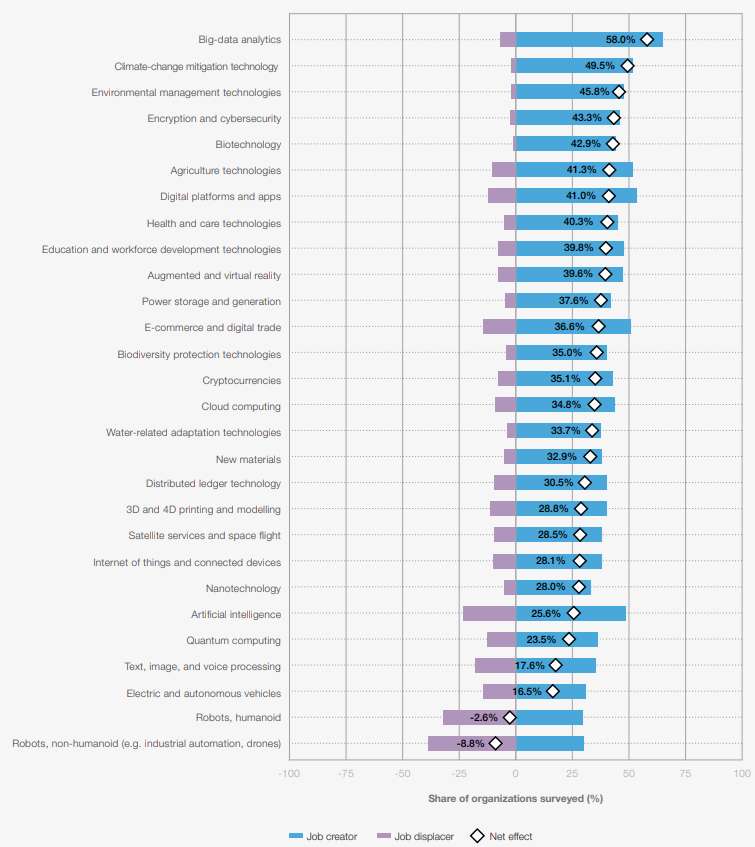

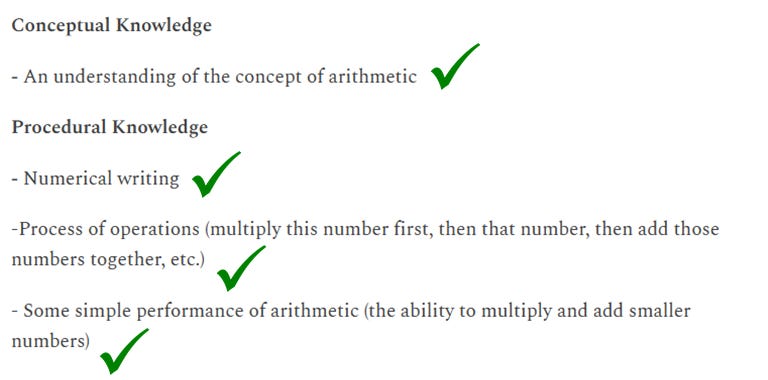


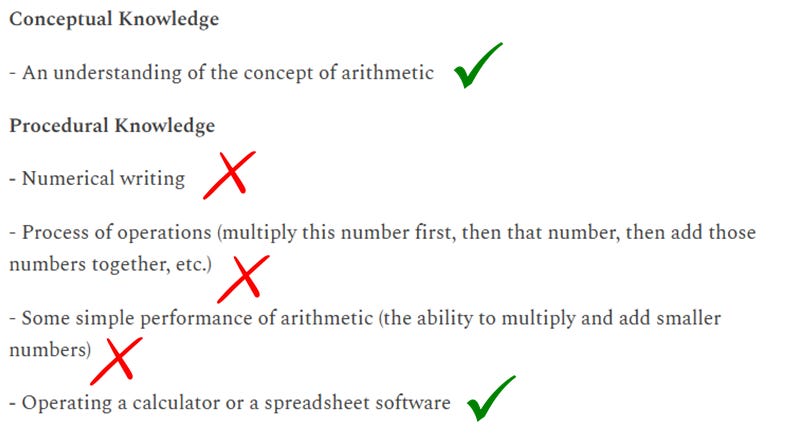

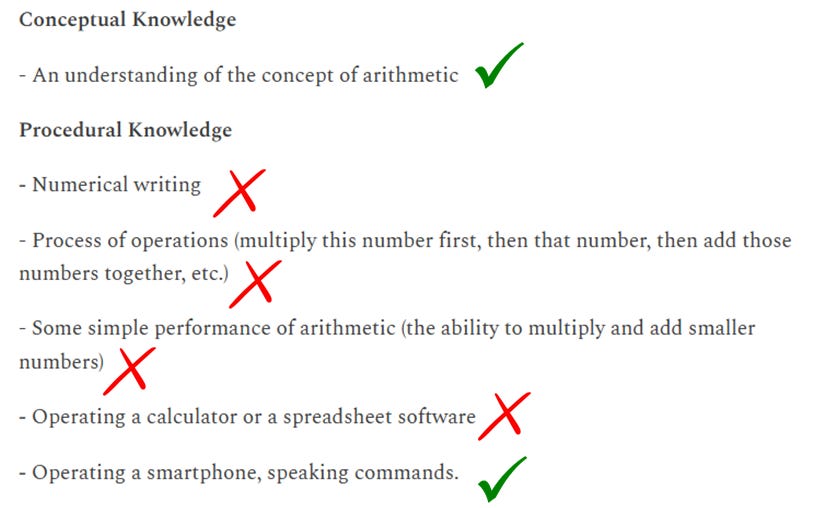
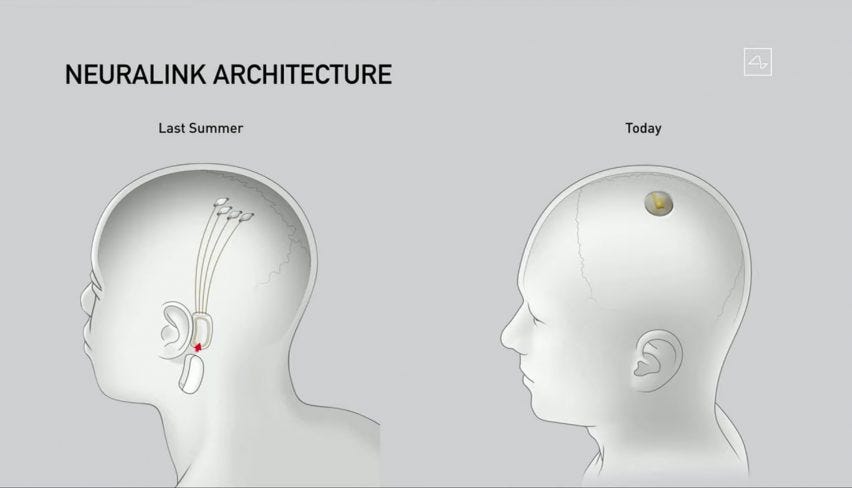
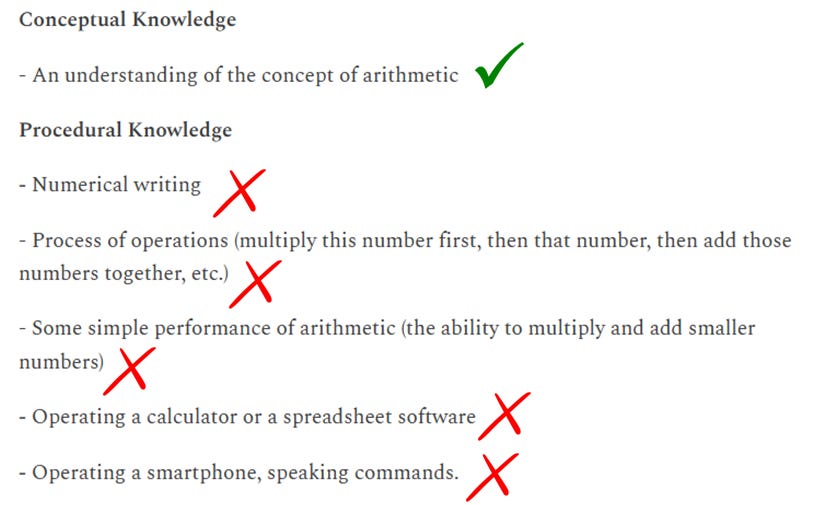
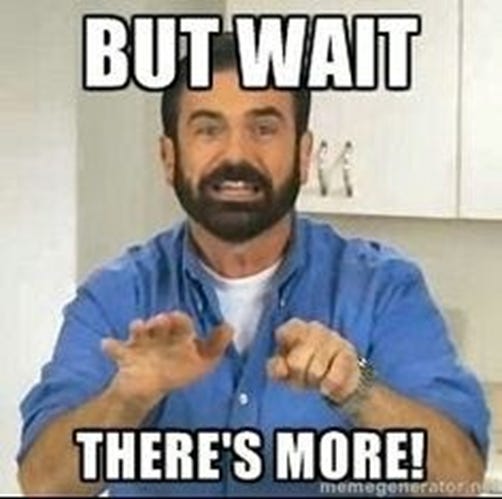

I won’t lie, I take some issues with this one. So let me gather my thoughts for a bit…
I think you are right that AI won’t take all the jobs. That being said, sometimes I can’t help but feel that we have lost/are losing something because of AI or automations in general.
But my biggest issue is with the idea that AI can do what the human mind can. I think you’re overselling AI a bit (and underselling the human mind), to be honest.
Now I’m going to get into metaphysics here so bear with me.
I think the issue is that people nowadays conflate the “brain” with the “mind” (by that, I mean just about everyone does it so I’m not picking on you). But the brain isn’t your mind, it’s simply a tool that our mind uses.
In terms of “AI creations”, I’m a little conflicted myself. I admit that I use AI generated images for my works because I can’t draw to save my life and I don’t have the money to hire artists willy-nilly. But AI Art isn’t a substitute for real artists. Real artists bring something to the table that computers don’t.
As someone who write fiction (and analyze them), I think there’s more to human creativity than simply taking what’s there and mashing them together. In fact, one of the biggest insults you can throw at a creative is to say that his work is a “rip-off”.
Sure, artists take inspiration from various places, but a good artist is able to make his own vision based on his inspirations. It’s the crappy artists who ended up making things that are nothing more than regurgitations of what’s already there. I don’t think it’s a coincidence that we see the rise of “AI Art” and “AI Stories” now that Hollywood had been producing nothing but rehashes, remakes, and general shlock.
Finally, the AI can’t do what the human mind can: make decisions. This might sound strange, but I don’t believe that AI really exists. By that I mean that the term itself a misnomer because it’s not really intelligence. It’s simply a tool that people use that’s been programmed beforehand.
For example, take a look at ChatGPT. First of all, it’s basically a more sophisticated Google Search. But it’s also been manipulated by their programmers to be politically biased.
As I said before, AI can’t make decisions, they can only do what’s been programmed beforehand. Meanwhile, human beings make decisions based on their moral values.
I’ll say no more because this comment is already long enough as it is. Enjoy my rant, lol. I’m looking forward to seeing the next part.